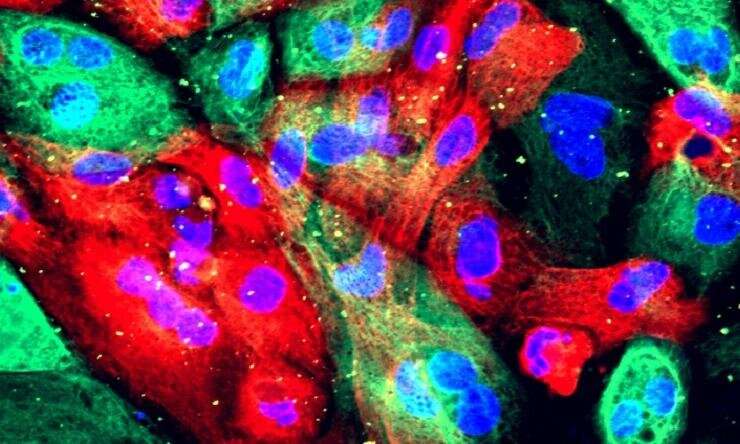This article has been reviewed according to Science X's editorial process and policies. Editors have highlighted the following attributes while ensuring the content's credibility:
fact-checked
trusted source
proofread
Attacking metastatic prostate cancer early with combination treatment approach improves outcomes in preliminary study

A team of UCLA Health Jonsson Comprehensive Cancer Center investigators has shown the combination of a short course of powerful and intense hormonal therapy with targeted radiation is safe and effective in treating people with prostate cancer that has come back and has spread to other parts of the body.
In the small study, researchers found that 50% of the patients who were treated with the combination therapy had no signs of cancer and remained free of recurrence six months after their treatment, with less than a quarter experiencing severe side effects from the treatment.
"In contrast, without this combined treatment approach, we would expect approximately 1% of patients to have no evidence of disease at the six-month stage," said Dr. Amar Kishan, professor of radiation oncology at the David Geffen School of Medicine at UCLA and senior author of the study.
"These results suggest a substantial improvement and strongly suggest there can be a meaningful impact—namely, delaying the need for hormonal therapy and thus without the significant side effects of it—by attacking metastatic prostate cancer early."
The results were published in the journal of European Urology.
Nearly all men who are diagnosed with metastatic hormone-sensitive prostate cancer are treated with androgen deprivation therapy, a type of hormonal therapy that aims to lower the levels of male hormones called androgens that can stimulate the growth of prostate cancer cells.
Hormonal therapy can have very significant side effects, like weight gain and loss of libido, and many end up choosing intermittent androgen deprivation therapy. This approach works by periodically stopping and then resuming therapy to better manage the side effects of the treatment. While intermittent androgen deprivation therapy offers a better quality of life for patients compared to receiving the treatment continuously, nearly all men in this setting see their cancer return within six months.
One way to prolong the use of hormonal therapy while controlling PSA levels is to leverage a combination of therapies, including stereotactic body radiation therapy (SBRT), which delivers highly focused and intense doses of radiation to the tumor while minimizing exposure to surrounding healthy tissues in short duration.
The UCLA team conducted a single-arm phase 2 trial to evaluate whether the addition of metastasis-directed SBRT and dual androgen receptor pathway inhibitors, a more potent but shorter course of hormonal therapy, to intermittent androgen deprivation therapy, improves the recurrence rates for men.
To find participants for the trial, the team used prostate-specific membrane antigen (PSMA) PET/CT scanning, a new, sensitive imaging test, to identify men with a limited burden of disease and who may be most likely to be helped by this combination approach.
The team enrolled 28 patients with recurrence of the disease following radical prostatectomy. Overall, the researchers found that the treatment was well tolerated; 93% of participants completed the treatment regimen, and only 21% experienced severe drug-related side effects.
"We found that the majority of patients tolerated this treatment without significant side effects. This is important because we are always taking into account how our treatments affect patients' short-term and long-term quality of life," said Dr. John Nikitas, a radiation oncology resident at UCLA Health and first author of the study.
At six months after testosterone recovery, which occurs when testosterone returns to normal levels after hormone therapy is stopped, the investigators found that 50% of patients remained recurrence-free.
The team also found that patients with no prior hormonal therapy were less likely to experience recurrence.
"This study marks a crucial step forward in managing recurrent metastatic prostate cancer," said Kishan. "The combination of highly potent systemic therapy and targeted radiation has shown impressive results in maintaining low PSA levels after testosterone recovery, offering hope for improved outcomes in these patients, but further studies are still needed to determine the best regimen."
More information: John Nikitas et al, Systemic and Tumor-directed Therapy for Oligorecurrent Metastatic Prostate Cancer (SATURN): Primary Endpoint Results from a Phase 2 Clinical Trial, European Urology (2024). DOI: 10.1016/j.eururo.2024.01.021




















